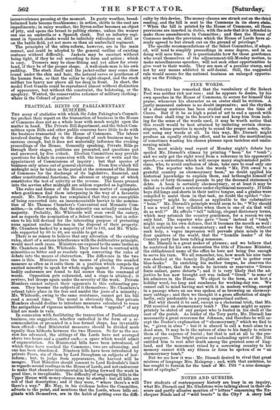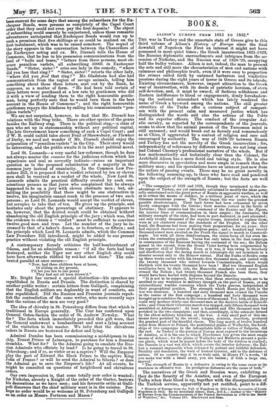NOTES AND QTIERIF.S.
Tin students of contemporary history are busy in an inqui7y, what Mr. Disraeli and Mr. Gladstone were talking-about in their ob- scure and partly allusive mention of" letters" concerning the Ex- chequer Bonds and of "wild beasts" in the City? A story be been current for some days that among the subscribers for the Ex- chequer Bonds, were persons so completely of the Capel Court order that they could not even pay the first deposits! The object of subscribing could scarcely be conjectured, unless those romantic adventurers anticipated that Exchequer Bonds would run up to such a premium that five shillings or so could be realized on the first instalment, which was to be raised somehow. The sequel of the story appears in the conversation between the Chancellors of the Exchequer acting and ex. Mr. Disraeli tells the House of Commons, that he has in his possession communications from the land of "bulls and bears," "letters from three persons, most ob- scure penniless varlets, all subscribing 5000/. in Exchequer Bonds." "Sister, sister !" cries one lady in the comedy, "where did you lose that ring ?" "Sister, sister !" retorts the other lady, "where did you find that ring ? " Mr. Gladstone had also had communication from the region of savage animals, telling him something about these three letters, sent out by the Bank, he supposes, as a matter of form. "Re had been told certain of these letters were purchased at a low rate by gentlemen who did it with a view of sending them to the right honourable gentle- man, being perfectly sure that he would turn them to the beat account in the House of Commons" ; and the right honourable gentleman repays the kindness by calling his communicants "pen- niless varlets "!
We are not surprised, however, to find that Mr. Disraeli has relations with the Stag tribe. There are other species of the genus besides the Railway stag. There is the political stag,—a class of men who set up in statesmanship without any political capital. The late Government knew something of such a Capel Court; and if W. B. could unfold tales about Frail of Shrewsbury, or Flewker of Derby, we need not wonder if Mr. Disraeli should enjoy the cooperation of "penniless varlets" in the City. Their story would be interesting, and the public awaits it in the next political novel.
Lord St. Leonards—a very useful law-reformer, though he does not always master the reasons for the judicious reform which his experience and zeal so correctly indicate—raises an important question as to the proposed substitution of a majority in the common jury instead of unanimity. In the Common Law Pro- cedure Bill, it is proposed that a verdict returned by ten or eleven men shall be received as a verdict of the whole. Now Lord St. Leonards admits the practical difficulty created by such con- scientious persons as that juror who complained that he always happened to be on a jury with eleven obstinate men ; but, ad- mitting the possibility that there might be one obstructive in twelve, his imagination cannot reach to the presence of two such persons ; so Lord St. Leonards would accept the verdict of eleven, but scruples to take that of ten. He gives up the principle, and hesitates only about the percentage of obstinacy. It appears to us, however, that the desired result could be obtained without abandoning the old English principle of the jury ; which was, that the evidence to obtain a "verdict" must be sufficient to convince twelve good men and true. Let the number of the jury be in- creased to that of a baker's dozen, or to fourteen, or fifteen ; and the principle which Lord St. Leonards admits, which the Common Law Procedure Bill introduced, might be added to our present practice without violating the old English principle.
A. contemporary fiercely criticizes the half-bombardment of Odessa, and for an admirable reason : "if all the forts had been destroyed, neither the Tiger nor any other English ship could have been afterwards riddled by red-hot shot there." The cele- brated parallel at once occurs— "Now, had these children been at home,
Or sliding on dry ground, I'll bet you ten to one penny They had not all been drown'd."
Mr. Bright has earned a special distinction—his speeches are republished in Russia and Prussia. The distinction is shared by another public writer : certain letters from Gallipoli, complaining that the English soldiers are deplorably in want of comforts, are also republished. Did the Russian and Prussian journals repub- lish the contradiction of the same writer, who more recently says that the rations of the men are very good ?
The idea of chivalry in St. Petersburg differs from that which is traditional in Europe generally. The Czar has conferred upon General Osten-Sacken the order of St. Andrew Newsky. What for ? The facts which immediately preceded this gift were, that the General underwent a bombardment and sent a lying account of the visitation to his master. We infer that the chivalrous orders in Russia are bestowed for defeat and lying.
Admiral Dundas has been commissioning a midshipman in his ship, Ernest Prince of Leinengen, to purchase for him a Russian droschka. What for ? Is the Admiral going to emulate the Rus- sian Admirals who officiate by land ? Is he going to travel to St. Petersburg ; and if so, as victor or as a captive ? Will the Emperor play the part of Edward the Black Prince to the captive King John of France ? or will he send the Admiral to Siberia ? or does the Admiral go to save the Emperor's life? At all events, he might be consulted on questions of knighthood and chivalrous orders.
Our own impression is, that some totally new order is wanted; for Nicholas, already a Knight of the order of the Garter, bestows Ins decorations as we have seen ; and his favourite critic at Galli- poli discovers that the chief military want is in the cuisine. Per- haps no order would be so welcome at St. Petersburg and Gallipoli as an order on Messrs. Fortnum and Mason ?



























 Previous page
Previous page